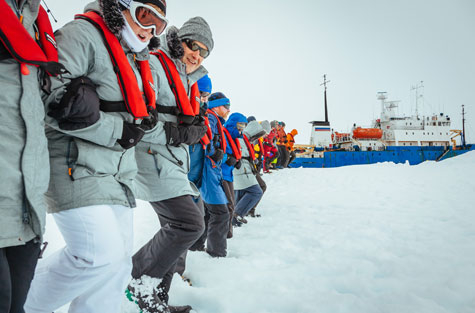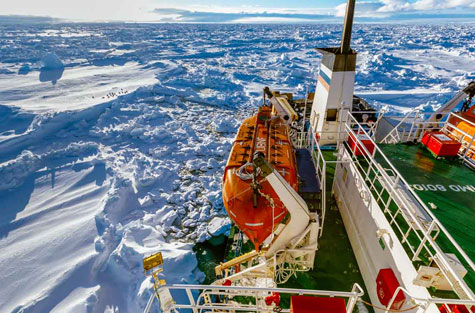
CANBERRA, Australia: An Australian icebreaker carrying 52 passengers who were retrieved from an icebound ship in the Antarctic resumed its journey home on Saturday, leaving behind two other icebreakers still trapped in pack ice.
The Aurora Australis will continue its interrupted resupply mission to Australia's Antarctic base Casey Station before returning to the Australian island state of Tasmania in mid-January with the rescued scientists, journalists and tourists.
It had been slowly cracking through thick ice toward open water after a Chinese ship's helicopter on Thursday plucked the passengers from their stranded Russian research ship and carried them to an ice floe near the Australian ship. But on Friday afternoon, the crew of the Chinese icebreaker that had provided the helicopter said they were worried about their own ship's ability to move through the ice.
The Australian Maritime Safety Authority's Rescue Coordination Centre, which oversaw the rescue, told the Aurora to stay in the area in case help was needed. Under international conventions observed by most countries, ships' crews are obliged to take part in such rescues and the owners carry the costs.
On Saturday, AMSA said the Aurora was allowed to continue and that the Chinese ship Snow Dragon, or Xue Long in Chinese, was safe and not requiring assistance.
The Chinese ship remained stuck several kilometers (miles) from the Russian icebreaker Akademik Shokalskiy, from which the passengers were rescued. The Russian ship has been immobile since Christmas Eve.
A reporter for China's official Xinhua News Agency aboard the Snow Dragon, Zhang Jiansong, reported an iceberg appeared overnight and blocked the ship's return route. He said the ship will again try to find a way out, possibly as early as Monday.
An Antarctic tourism operator is holding out hope that the Russian icebreaker will be free in time to take 48 sightseers on a cruise of Antarctica's Ross Sea.
Heritage Expeditions has leased the Akademik Shokalskiy to depart New Zealand for the cruise on Jan. 17.
Heritage Expeditions general manager David Bowen said he would give the ship until Monday to break free from the pack ice before considering "other options."
"The last report we had from the ship is that her integrity is sound and she's in good shape," Bowen said. "If the wind blew from the right direction for a day or two, she could sail free."
Bowen said that unlike Commonwealth Bay where the ship is stuck, the passage to the Ross Sea is ice free and its ice patterns were regular in January and February.
Andrew Peacock, an Australian doctor and photographer who was rescued from the Russian ship, spoke Friday of his fellow passengers' frustration aboard the Aurora over the latest delay in their journey home. He said they were quiet and appeared tired as they took stock of their situation.
"So our time down south is not over yet and we are going to be delayed in our return to friends and family by some time yet, which is frustrating," Peacock said in an email before the Aurora was given permission to continue.
The Aurora had offloaded only 70 per cent of its cargo at Casey last month before it was diverted to the rescue.
It will now deliver the remaining 30 per cent, which includes scientific equipment vital to research projects scheduled to be carried out during the narrow window of the Antarctic summer.
Australian Antarctic Division acting director Jason Mundy said the rescue had stretched resources for the summer research program, which he hoped to recoup from the Russian ship's insurer.
In addition to the disruption to Australia's scientific program, the rescue would cost Australian taxpayers 400,000 Australian dollars ($358,000), Environment Minister Greg Hunt's spokesman John O'Doherty said.
"This incident is a reminder that everyone operating in the Southern Ocean ... has to put safety ahead of everything else," Hunt said in a statement.













